Results
-
 £59.95
£59.95Music from Kantara - Kenneth Downie
Despite the exotic sounding title, the origins of Kenneth Downies fine composition are somewhat more prosaic. When the composer and his wife moved into a new home they were intrigued to find it called Kantara. Not wanting to upset the outgoing owners, and wishing to find out more, they decided to keep the name.Some judicious research found that Kantara was a ruined castle in Northern Cyprus which the previous owners had once visited. A picture of it was left hanging on the wall of the house for the new owners to enjoy.Written in 1993 for the National School Band Association Composer Competition, it has subsequently been used at youth and senior level - from the National Youth Band Championships of Great Britain to the Pontins Championship.The three-movement work is in no way descriptive, but each has individual character - from a light hearted spiritoso followed by a short lyrical middle section to an animated presto finale.
Estimated dispatch 5-14 working days
-
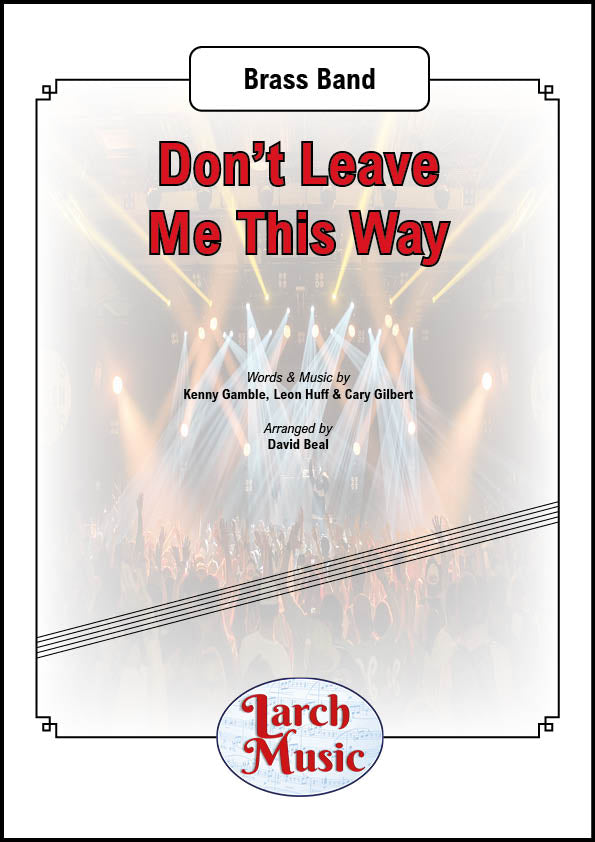 £25.00
£25.00Don't Leave Me This Way - Brass Band Sheet Music Full Score & Parts - LM941
WORDS & MUSIC : Kenneth Gamble, Leon Huff and Cary GilbertARRANGER: David Beal"Don't Leave Me This Way" is a song written byKenneth Gamble,Leon Huff, andCary Gilbert. It was originally released in 1975 byHarold Melvin & the Blue NotesfeaturingTeddy Pendergrass, an act signed to Gamble & Huff'sPhiladelphia Internationallabel. "Don't Leave Me This Way" was subsequently covered by American singerThelma Houstonin 1976 and British duothe Communardsin 1986, with both versions achieving commercial success.But now available, as recorded by the Communards, for brass band ready for your next concert.A definite crowd pleaser and foot-tapper.Sorry UK sales onlyLM941 - ISMN : 9790570009411
In Stock: Estimated dispatch 3-5 working days
-
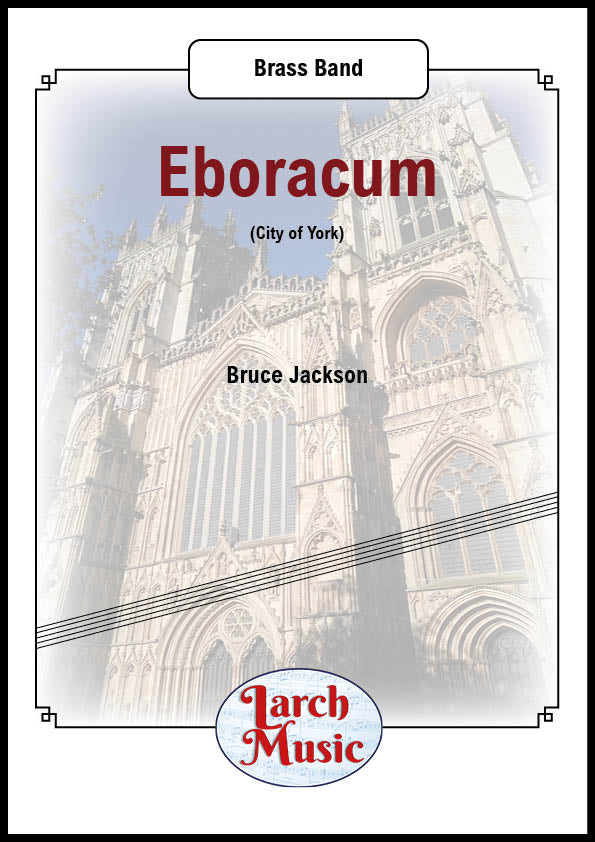 £25.00
£25.00Eboracum (Bruce Jackson) - Brass Band Sheet Music Full Score & Parts - LM426
COMPOSER: Bruce JacksonBrass Band Sheet Music Full Score & PartsA brand new march for brass bandEboracum was a fort and later a city in theRoman province of Britannia. In its prime it was thelargest town in northern Britain and a provincial capital.The site remained occupied after the decline of theWestern Roman Empire and ultimately developed into thepresent-day city of York, in North Yorkshire, England.Two Roman emperors died in Eboracum:Septimius Severus in 211 ADandConstantius Chlorusin 306AD.LM426 - ISMN : 9790570004263
In Stock: Estimated dispatch 3-5 working days
-
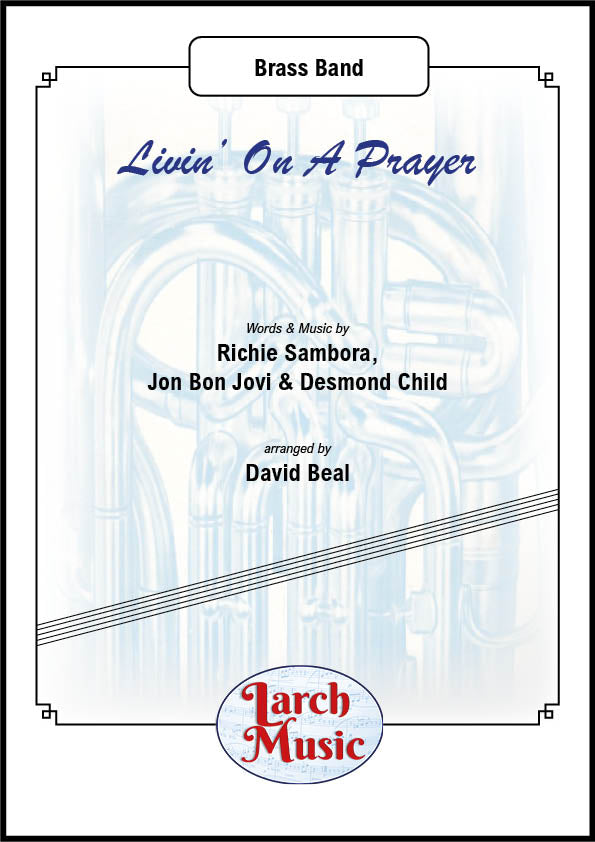 £30.00
£30.00Livin' On A Prayer - Brass Band Sheet Music Full Score & Parts - LMAM019 - Richie Sambora, Jon Bon Jovi & Desmond Child - David Beal
COMPOSER: Richie Sambora, Jon Bon Jovi & Desmond ChildARRANGER: David Beal"Livin' on a Prayer" is a song by the American rock band Bon Jovi from their third studio album, Slippery When Wet. Written by Jon Bon Jovi, Richie Sambora and Desmond Child, the single, released in late 1986, performed strongly on both rock and pop radio and its music video was given heavy rotation at MTV, giving the band their first song to reach No. 1 on the Billboard Mainstream Rock chart and their second consecutive No. 1 Billboard Hot 100 hit.Regarded as the band's signature song, "Livin' on a Prayer" has topped fan-voted lists and re-charted around the world decades after its release. In 2013, the song was certified triple platinum for over 3 million digital downloads and has since sold over 13 million worldwide, making it one of the best selling singles of all time.Scored here for British Brass Band.Any purchases from this site cannot be made please click on the link above
In Stock: Estimated dispatch 3-5 working days
-
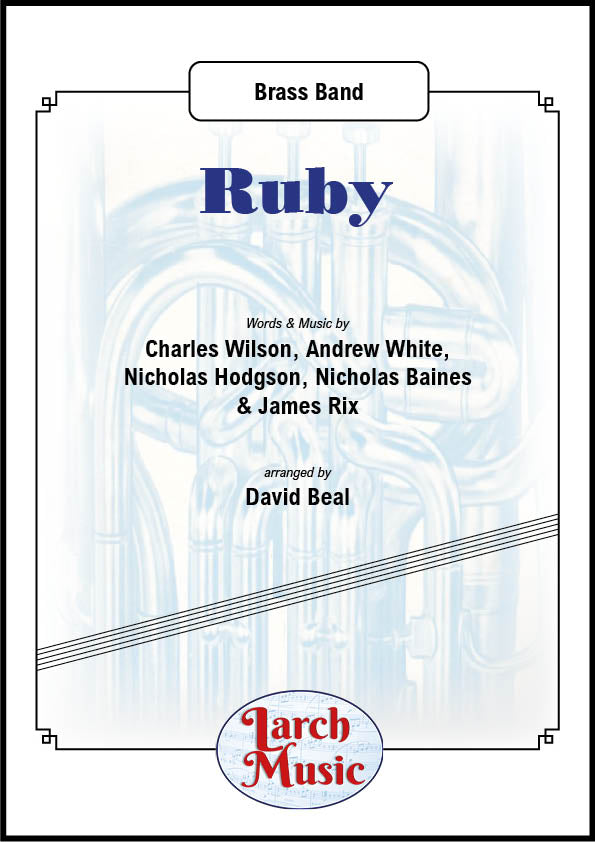 £30.00
£30.00Ruby - Brass Band Sheet Music Full Score & Parts - LMAM044
Any purchases from this site cannot be made please click on the link aboveCOMPOSER: Charles Wilson, Andrew White, Nicholas Hodgson, Nicholas Baines & James RixARRANGER: David Beal"Ruby" is a song by English indie rock band Kaiser Chiefs. It was released in the United States on 29 January 2007 and in the United Kingdom on 5 February as the lead single from their second studio album, Yours Truly, Angry Mob (2007). It became the band's first British number-one single on 25 February 2007 and ended 2007 as the year's 10th-biggest-selling single in the UK, with total sales of 313,765. As of September 2016, it has sold over 600,000 copies in the UK as stated by the British Phonographic Industry (BPI). In the US, it charted at number seven the Billboard Adult Alternative Airplay chart, becoming the band's highest-charting hit in the US. "Ruby" was voted number 13 on the Triple J Hottest 100 of 2007, Australia's largest annual music poll.Scored here for British Brass Band.Any purchases from this site cannot be made please click on the link above
In Stock: Estimated dispatch 3-5 working days
-
 £69.99
£69.99Music from Tombstone - Bruce Broughton - Philip Sparke
Released in cinemas in 1993, Tombstone is an American western written by Kevin Jarre and directed by George Cosmatos. Starring Kurt Russell and Val Kilmer, it was narrated by Robert Mitchum and is based on events relating to the Gunfight at the OK Corral, and the subsequent Wyatt Earp Vendetta, both of which took place in Tombstone, Arizona.The theme is crime, political corruption and law enforcement in the American west during the 1880s. The score was by Bruce Broughton, and this selection features music from the opening and closing credits.
Estimated dispatch 5-14 working days
-
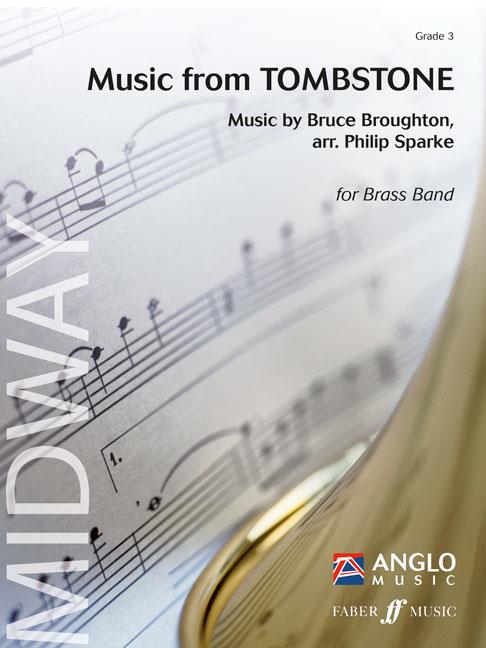 £69.99
£69.99Tombstone, Music from (Brass Band - Score and Parts) - Broughton, Bruce - Sparke, Philip
Released in cinemas in 1993, Tombstone is an American western written by Kevin Jarre and directed by George Cosmatos. Starring Kurt Russell and Val Kilmer, it was narrated by Robert Mitchum and is based on events relating to the Gunfight at the OK Corral, and the subsequent Wyatt Earp Vendetta, both of which took place in Tombstone, Arizona. The theme is crime, political corruption and law enforcement in the American west during the 1880s. The score was by Bruce Broughton, and this selection features music from the opening and closing credits.Duration: 5.00
Estimated dispatch 7-14 working days
-
 £35.00
£35.00Music Through The Ages - Steve Robson
A fun and educational collection of 7 pieces created by Steve Robson, with optional narration, providing a time-travelling journey through the history of 2000 years of music to the present time.Originally written for Stanhope Youth Band, the piece has now been well received by other youth bands far and wide. The complete work offers great flexibility too, as te movements can be used as stand-alone items or as a full concert performance, offering players and audiences an insight to the evolving styles of Music Through The Ages.Movements include:FanfareThe Passing of the VIth Legion A Patrol - Imagining the sound of the Roman Legion at Vindolanda (AD84)The Journey of St Cuthbert - A Plainchant (995)The Honorable Robert Shafto MP - Late Baroque Style (1749)The Very Capable Mr Mozart Classical Style - Rondo (1786)Sans Pareil March - Tribute to Timothy Hackworth and George Allan (1913)The Angel of the North - Contemporary composition (Present day)Watch a full performance below of the pieces, including narration. This was a collaborative performance project, presented by members of different youth bands from across the North East on Saturday 13 November 2018 in the Theatre at Ushaw College, Durham.(NB: The piece Galliard, performed at 12mins 22secs into the video, was specially written for the concert and is not included in this collection.)Look and Listen (with thanks to all participating youth bands and supporting players):Set includes score (with narration), separately bound narration (enable a choice of either compere/conductor presentation) and parts including:Cornet 1Cornet 2Corent 3FlugelhornEb Tenor Horn 1Eb Tenor Horn 2Baritone 1Baritone 2Trombone 1Trombone 2Bass TromboneEuphoniumEb BassBb BassTimpaniPercussionAdditional world parts also provided include F Horn 1, F Horn 2, Trombone 1 in Bass Clef, Trombone 2 in Bass Clef.
In Stock: Estimated dispatch 3-5 working days
-
 £64.95
£64.95Music for Greenwich (Brass Band - Score and Parts) - Gregson, Edward
Music for Greenwich was commissioned in 1980 by the Greenwich Theatre, London, for a new production of Peter Buckman's play 'All Together Now'.In this play, about a down-at-heels brass band in the North of England brought to a new level of self-confidence and achievement by an incoming conductor, the whole cast performed a test piece on stage every night (i.e. Music for Greenwich), in readiness for a competition which they have entered and, of course, win. Although the play is as much a social commentary as anything to do with music-making, every member of the cast had to be able to play a brass instrument to a greater or lesser extent (a difficult challenge for the casting Director!).For obvious reasons, the music is not technically difficult. The work is structured as follows: a brief fanfare-like opening is followed by an allegro section, rhythmic and playful; a slow lyrical section is then introduced (a suitably nostalgic melody featuring solos for cornet and trombone), before a return to the fast music, a hint of the fanfare, and finally a climactic flourish to round things off. This is music to be enjoyed, as hopefully it was every night by the audience and actors alike.Duration: 5.00
Estimated dispatch 7-14 working days
-
 £24.95
£24.95Music for Greenwich (Brass Band - Score only) - Gregson, Edward
Music for Greenwich was commissioned in 1980 by the Greenwich Theatre, London, for a new production of Peter Buckman's play 'All Together Now'.In this play, about a down-at-heels brass band in the North of England brought to a new level of self-confidence and achievement by an incoming conductor, the whole cast performed a test piece on stage every night (i.e. Music for Greenwich), in readiness for a competition which they have entered and, of course, win. Although the play is as much a social commentary as anything to do with music-making, every member of the cast had to be able to play a brass instrument to a greater or lesser extent (a difficult challenge for the casting Director!).For obvious reasons, the music is not technically difficult. The work is structured as follows: a brief fanfare-like opening is followed by an allegro section, rhythmic and playful; a slow lyrical section is then introduced (a suitably nostalgic melody featuring solos for cornet and trombone), before a return to the fast music, a hint of the fanfare, and finally a climactic flourish to round things off. This is music to be enjoyed, as hopefully it was every night by the audience and actors alike.Duration: 5.00
Estimated dispatch 7-14 working days




